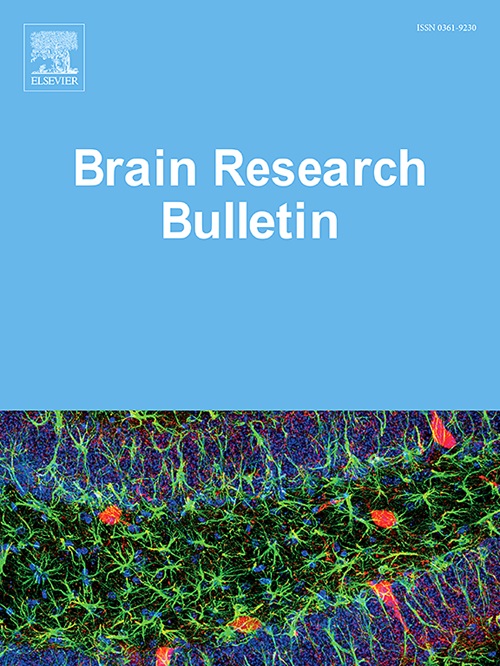右美托咪定通过激活Nrf2减少氧化应激和血脑屏障破坏来减轻术后谵妄
IF 3.7
3区 医学
Q2 NEUROSCIENCES
引用次数: 0
摘要
背景术后谵妄(POD)以认知功能障碍为特征,是手术后常见且严重的并发症。血脑屏障(BBB)对维持中枢神经系统(CNS)稳态至关重要,其破坏与POD有关。右美托咪定(Dexmedetomidine, DEX)是一种α2-肾上腺素能受体激动剂,可能通过激活核因子红细胞2相关因子2 (Nrf2)通路,调节抗氧化反应,减轻血脑屏障损伤,从而降低POD的发生率。方法本研究采用转录组学分析鉴定POD患者的差异表达基因,探讨DEX的治疗靶点。利用HCMEC/D3细胞和POD小鼠体内模型进行体外实验,评估DEX对血脑屏障完整性和神经炎症的影响。Western blotting、流式细胞术和ELISA分别检测蛋白表达、细胞凋亡和细胞因子水平。行为学测试(开场和y迷宫测试)评估小鼠的认知功能。结果生物信息学分析显示Nrf2是DEX的关键靶点。DEX治疗显著增加Nrf2表达,减轻HCMEC/D3细胞的氧化应激和神经炎症。在POD小鼠模型中,DEX改善了认知功能,在行为测试中表现增强。DEX还上调小鼠脑组织中Nrf2的表达,降低血清炎症。此外,DEX通过上调紧密连接蛋白来保持血脑屏障的完整性,这被Nrf2抑制剂ML385逆转。结论dex通过激活Nrf2改善POD,从而减少氧化应激和炎症,维持血脑屏障完整性。这些发现表明,DEX是一种潜在的POD治疗剂,突出了Nrf2通路作为治疗策略的新靶点。本文章由计算机程序翻译,如有差异,请以英文原文为准。
Dexmedetomidine attenuates postoperative delirium by activating Nrf2 to reduce oxidative stress and blood-brain barrier disruption
Background
Postoperative delirium (POD), characterized by cognitive dysfunction, is a prevalent and severe complication following surgery. The blood-brain barrier (BBB) is crucial in maintaining central nervous system (CNS) homeostasis, and its disruption is associated with POD. Dexmedetomidine (DEX), an α2-adrenergic receptor agonist, potentially reduces POD incidence by activating the nuclear factor erythroid 2-related factor 2 (Nrf2) pathway, which regulates antioxidant responses and alleviates BBB damage.
Methods
This study used transcriptomic analysis to identify differentially expressed genes in patients with POD and explored the therapeutic targets of DEX. In vitro experiments using HCMEC/D3 cells and an in vivo mouse model of POD were conducted to assess the effects of DEX on BBB integrity and neuroinflammation. Western blotting, flow cytometry, and ELISA were used to evaluate protein expression, apoptosis, and cytokine levels, respectively. Behavioral tests (open-field and Y-maze tests) were performed to assess cognitive function in mice.
Results
Bioinformatics analysis revealed Nrf2 as a key target of DEX. DEX treatment significantly increased Nrf2 expression and alleviated oxidative stress and neuroinflammation in HCMEC/D3 cells. In the POD mouse model, DEX improved cognitive function, evidenced by enhanced performance in behavioral tests. DEX also upregulated Nrf2 expression in the mouse brain tissue and reduced serum inflammatory. Furthermore, DEX preserved BBB integrity by upregulating tight junction proteins, which was reversed by the Nrf2 inhibitor, ML385.
Conclusions
DEX ameliorates POD by activating Nrf2, thereby reducing oxidative stress and inflammation, and maintaining BBB integrity. These findings suggest DEX is a potential therapeutic agent for POD, highlighting the Nrf2 pathway as a novel target for treatment strategies.
求助全文
通过发布文献求助,成功后即可免费获取论文全文。
去求助
来源期刊

Brain Research Bulletin
医学-神经科学
CiteScore
6.90
自引率
2.60%
发文量
253
审稿时长
67 days
期刊介绍:
The Brain Research Bulletin (BRB) aims to publish novel work that advances our knowledge of molecular and cellular mechanisms that underlie neural network properties associated with behavior, cognition and other brain functions during neurodevelopment and in the adult. Although clinical research is out of the Journal''s scope, the BRB also aims to publish translation research that provides insight into biological mechanisms and processes associated with neurodegeneration mechanisms, neurological diseases and neuropsychiatric disorders. The Journal is especially interested in research using novel methodologies, such as optogenetics, multielectrode array recordings and life imaging in wild-type and genetically-modified animal models, with the goal to advance our understanding of how neurons, glia and networks function in vivo.
 求助内容:
求助内容: 应助结果提醒方式:
应助结果提醒方式:


